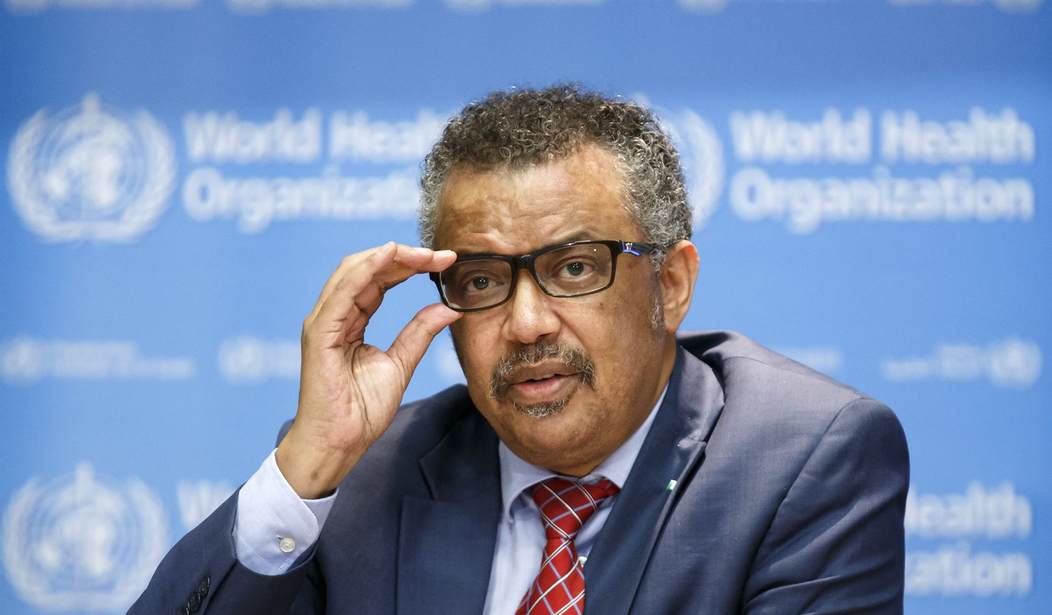There can be no doubt left in anyone’s minds that the World Health Organization (WHO) has completely, utterly, and totally failed in their response to the Covid-19 pandemic. Whether it be covering up for the Chinese Communist Party, suppressing knowledge of successful efforts to combat the virus in democratic Taiwan, or promoting downright scientific falsehoods, the systemic failings of the WHO are to a large degree responsible for the global severity and scope of Covid-19. This failure led the United States to redirect taxpayer funding from the failing agency to other organizations with a record of actually achieving positive health results.
With near unanimous criticisms from governments and public health bodies across the world, it was hoped that the WHO would have learned from their mistakes and stopped placing politics above people’s lives. Unfortunately, this does not appear to be the case as the WHO continues to use taxpayer resources to promote projects that are not only simply contrary to science, but are downright dangerous and hinder (rather than help) public health around the world. And now, it appears, the links between the WHO protecting the CCP and their “unrelated” projects might be a lot closer than may appear at first.
A recent example of this is a new campaign by the WHO attempting to “warn” persons of the danger of reduced risk alternatives to deadly combustible tobacco, such as electronic cigarettes. This particular ideological obsession by WHO bureaucrats has puzzled public health experts, given that the world’s leading health authorities have determined vaping to be 95 percent safer than smoking, and is a quitting aid three times more effective than more traditional nicotine replacement therapies. As such, any campaign which ultimately leads to more people continuing to smoke deadly combustible cigarettes would seem something that would be dreamt up in the smoke-filled back rooms of a tobacco company, and not by a supposed public health organization.
Particularly egregious was a new campaign launched last week by the WHO to promote a claim that vaping causes heart attacks. To support this campaign, they cite research by former University of California academic Professor Stanton Glantz, who recently retired from academia, two years after two women accused him of sexual harassment leading to a six figure settlement agreement.
Recommended
This study, however, has been completely debunked and retracted by the journal where it was first published, after it was discovered that the heart attacks in the study took place prior to the users commencing vaping. As such, absent the existence of time-travel devices, it is simply impossible to conclude that vaping causes heart attacks, and indeed the evidence goes the other way around – that heart attacks lead to vaping, as smokers use them as a wake-up call to quit their deadly habit and transition to a product that is 95% safer.
The fact that this study was retracted following ridicule throughout the scientific community, it still received widespread media attention, and would surely be known to the WHO. Despite the scientific malpractice of Glantz, the WHO chose to use it to support a campaign. This is, essentially, identical to anti-vaxxers on social media relying on long debunked and retracted studies that vaccines cause cancer. Indeed, in denying overwhelming scientific evidence, both the anti-vaccination movement and the WHO are actively promoting lifestyle choices that have the potential to cause millions of deaths worldwide.
Despite actively working to undermine the most effective quit smoking tool presently available, the WHO maintains it is opposed to tobacco use, and in doing so points to its campaign for the “plain packaging” of tobacco, which it claims would reduce smoking rates. However, this claim is belied by more than 7 years of data from countries such as the UK, France, and Australia, which conclusively demonstrate that plain packaging has zero impact on tobacco consumption whatsoever. In fact, another study about Australia has come out in the prestigious journal Nature last week reaffirming the idea that plain packaging does not reduce tobacco use. Indeed, the only demonstrated effect of plain packaging has been an explosion in illicit tobacco, as without the protections and security features packaging provides, producing black market counterfeit products is considerably easier.
Given the proven failure of plain packaging to reduce smoking rates, and the well documented successes of reduced risk devices, it is curious then why the WHO is promoting a policy that will protect tobacco interests, and keep people hooked on smoking, as well as provide a boon for state tobacco monopolies and illicit tobacco smugglers who are protected by plain packaging.
It's interesting to note then that the state-owned (CCP controlled) China Tobacco company is the world’s largest manufacturer of tobacco, and would benefit the most from people continuing to smoke. Similarly, it is an interesting ‘coincidence’ that 99 percent of the world’s illicit tobacco comes from the People’s Republic of China.
In much the same way as during the Covid-19 pandemic, it was revealed that the WHO’s leadership was committed to protecting the Chinese Communist Party at the expense of the lives of hundreds of thousands, it certainly is curious that the biggest beneficiary of the WHO’s crusade against vaping and for plain packaging would end up benefiting the Chinese Communist Party the most.
What a remarkable coincidence.
Tim Andrews is a senior fellow for the Taxpayers Protection Alliance.

























Join the conversation as a VIP Member